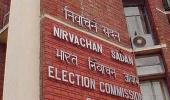'The collegium system will remove any such doubts from the minds of people and the political parties.'

In a landmark ruling, the Supreme Court of India on Thursday, March 2, 2023, held that the appointment of the Chief Election Commissioner and election commissioners will henceforth be done by the President on the advice of a committee comprising the prime minister, the Leader of the Opposition in the Lok Sabha and the Chief Justice of India.
In November 2022, the Supreme Court, hearing a petition against Arun Goel's appointment as election commissioner, had observed that the appointment was done at 'lightning speed' with his file travelling within departments in 24 hours.
The apex court had then asked how the Union law minister shortlisted a panel of four names that was recommended to the prime minister for appointment as election commissioner when none of them would have completed the stipulated six-year tenure in office.
Referring to Goel's appointment in particular, the Supreme Court had asked, 'What kind of evaluation is this? Although we are not questioning the merits of Arun Goel's credentials, but the process...'
Thursday's verdict prescribing a stipulated process for the appointment of the CEC and election commissioners is the culmination of that lawsuit.
Syed Firdaus Ashraf/Rediff.com spoke to T S Krishnamurthy -- who served as chief election commissioner between February 2004 and May 2005; Mr Krishnamurthy was an election commissioner between January 2000 and February 2004 -- to find out if the new procedure to appoint election commissioners is workable.
How do you see this judgment?
I have always held the view that even though I have nothing against any particular appointment or so, I always held the view that a collegium is better so the credibility of the institution gets enhanced.
I have been saying this since 2004 when I was the chief election commissioner.
I recently wrote also that the collegium is a better system as three heads are better than one, as political parties and people will know what is happening regarding the appointment (of election commissioners).
This will certainly not raise doubts about the various appointments.
The way Arun Goel was appointed as an election commissioner, which the Supreme Court commented was done with lightning speed, do you feel his appointment was wrong?
I do not know what was the background to his appointment and how he was appointed. Therefore, I am not in a position to comment on his appointment, but I always said that every vacancy should be filled up immediately.
For example, the vacancy was there for too long and the election was to take place and the government took the decision. This decision the government could have taken earlier. (The vacancy had arisen after CEC Sushil Chandra's retirement in May, but the government did not appoint anyone for six months, until Arun Goel was appointed in November.)
No vacancy should be kept for long in the Election Commission.
They should anticipate and appoint in posts earliest so that the election body is fully appointed.
All the three election commissioners should be available all the time because they keep taking decisions (all the time).
But if you go back in history, who curtailed the power of the election commissioner by bringing in two more election commissioners?
It was (then prime minister) P V Narasimha Rao who got two more election commissioners. They were subordinate to the Chief Election Commissioner.
By bringing the other two election commissioners to the Election Commission he also brought the decision that the majority decision will prevail.
Originally, they were not given Supreme Court judge's rank but subsequently, when then then Chief Election Commissioner T N Seshan objected to the other two election commissioners being treated as equal, they were also made equal in Supreme Court judge's rank.
The three-member body, which originally constituted, was revised by a statutory provision. The earlier appointment was not a statutory appointment. It was then a statutory appointment when M S Gill and G V G Krishnamurthy were appointed.
All said and done, there were always complaints about appointments by some people and so on. I feel the collegium system will remove any such doubts from the minds of people and the political parties.
What does the Constitution of India say about appointment of election commissioners? Is there any procedure laid down for this?
There was a procedure which said the prime minister in consultation with his Cabinet recommends a name (for election commissioner). Whether it is proper or adequate is the question and people did raise questions.
Now somebody went to court and the court has given a ruling.
In my time in 2004, I had indicated this kind of appointment.
Is this ruling a good one for our democracy?
As I said, people should have credibility in each Constitutional body. And when appointments are made by three members, I am sure people and the political parties will at least realise that it is a credible appointment and a credible institution.
Do you think this decision can have far-reaching repercussions as the appointment of judges too can be questioned by the government?
You have to understand the difference between the collegium system and the collegium procedure suggested here. Over there, judges decide and they do not accept any further change. They do not allow any outsiders in their collegium.
In this, outsiders are there as the Chief Justice of India is there and the Leader of the Opposition too is there. So this is a slightly different proposition. You cannot compare both.
In this case, it is an improvement. If this collegium system does not work, then you have to find an alternative. It is an experiment with a new system as this can take some time on how it can work and if there is misuse or questionable decisions taken, then you can go for another alternative.
In some countries, election commissioners are appointed with the approval of parliament. And in my opinion this judgment is good as the approval of parliament will take a lot of time.
For example, if there is a vacancy coming out, then parliament will have to decide six months earlier and these things are not easily or practically possible.
So my suggestion is, try this collegium system and we will see whether there is any need for improvement.
Do you think the government will let the verdict stand as it dilutes its decision-making authority?
I am not here to predict what the government will do or what action they will take as it is for them to decide. And there is a Constitution that guides everything.
If there is any Constitutional method through which they want to change something, it is for them to decide.
So, I am not in a position to decide what the government will do now.










